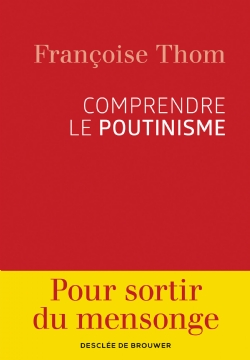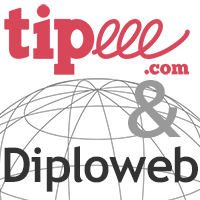Why and how does V. Putin win a fourth presidential term in Russia ?
An interview with Françoise Thom
Par ,
, le 25 avril 2018 


Françoise Thom, USSR and Post-Communist Russia expert, teaches History at Sorbonne University. She has published numerous works including "Les Fins du communisme" (1994), "Beria : le Janus du Kremlin" (2013), and more recently "Géopolitique de la Russie" (with J.-S. Mongrenier, 2016). Laurent Chamontin graduated from Polytechnique and has lived and traveled in the Russian world. He is the author of "Ukraine et Russie : pour comprendre. Retour de Marioupol", Éditions Diploweb 2016, available on Amazon. Translated from French to English by Estelle Ménard, revised by Alan Fell.
How does one explain that the winner of the presidential election in Russia is "known" several weeks before the ballot ? To better understand, Diploweb.com journalist Laurent Chamontin met Françoise Thom who has just published “Comprendre le poutinisme”, Paris, éd. Desclée De Brouwer. (French version published March 4, 2018).
Laurent Chamontin (L.C.) : Russia’s March 2018 election results leave no doubts. But then, why hold elections ? What is the logic behind the selection or the elimination of candidates ?
François Thom (F .T.) : In Russia, elections are, above all, a way for the government to control the efficiency of regional authorities. A governor is judged by his capacity to have his citizens vote “correctly”. Elections also aim at symbolizing the regime’s legitimacy, particularly in the eyes of foreigners. It is the presidential administration which selects the candidates. Its primary goal is to make sure that no alternative candidate overshadows the only real candidate, Vladimir Putin. The choice of “Potemkin” candidates is however inspired by other considerations. The first one is to split the potentially dissenting vote. Thus three candidates, Ksenia Sobtchak, Grigori Yavlinski, Boris Titov, all compete for the representation of the liberal stream ; three candidates, Pavel Grudinin, Sergueï Baburin, Maxime Souraïkin, are rivals for the communist vote. And let us not forget the perpetual “spoiler”, V. Jirinovski. The pseudo-electoral campaign’s function is to discredit the two virtually alternative currents : the liberals for their lack of patriotism (K. Sobtchak condemns the annexation of Crimea), the national-communists for their hypocrisy (Pavel Grudinin allegedly holds bank accounts in Switzerland). Navalny’s candidacy has been rejected because his crusading campaign against corruption within the Kremlin circle would destabilize the regime if he had access to state television. Navalny is charismatic, he is a good speaker and he is combative. He could seriously make the task more difficult for Vladimir Putin. Lastly, the presidential administration’s ultimate objective is to smother abstention which, should it become excessive, would tarnish Vladimir Putin’s triumph, especially since Navalny called to boycott the elections.
L.C. : More generally, what are the similarities and differences between Putinism and the soviet regime ?
F.T. : Let’s start with the power structure. In the USSR and in Russia, the real power doesn’t lie within the institutions as provided for in the constitution. There is a parallel center of informal power that is hidden, and which overarches the administrative hierarchy : this was the Secretariat of the Central Committee in USSR and is the Presidential Administration in today’s Russia. In both cases the government has no decision-making power. Nonetheless there are differences between the Soviet model and contemporary Russia. Under Putin, power is more personalized than it was during the Soviet era. Even at the time of Joseph Stalin, some collegiality existed. This is no longer the case. On the other hand, the “siloviki” (army, security services, police and the prosecution) still conspicuously swallow up the lion’s share of the state budget. Targeted repression of the state opponents was common practice under Yuri Andropov, and still is today.
Russia no longer has an official ideology. The Propaganda Department’s role is entrusted to the Orthodox Church. Hatred towards the West, which was a sort of folklore in the USSR, plays a functional role within Putin’s regime. The Russian people consents to be plundered by its elites as long as the latter dangles the carrot of Russia’s restoration as a great power – aka a country capable of taunting the West. This is a fundamental difference between the Yeltsin regime and that of Putin. The Putin regime indeed is “hybrid”. Its elites line their pockets in Russia before placing their ill-gotten gains abroad, where they “delocalize” their close relatives. By contrast, the same people get themselves off the hook in Russia by indulging in a boisterous Orthodoxy, sponsoring “patriotic” projects against the Western world. The more blatant the elite corruption is, the more the official propaganda emphasizes the great power ideology, and the more they showcase the confrontation with the West as the raison d’être of Russian foreign policy. Putin’s “hybrid” strategy finds its roots in Bolshevism. When the Westerners were complaining about the Komintern’s subversive activities in their respective countries, Soviet diplomats retorted that USSR citizens did have the right to behave according to their convictions when they were abroad, that the Soviet government had nothing to do with it, and that it was completely unaware of their actions.
Although Russian foreign policy pursues the same objectives as the USSR (expulsion of Americans in Europe, sabotage of European solidarity, of European soft power, hostility towards the United States, solidarity with anti-Western third-world dictatorships), it demonstrates less cohesion and consistency than before. Putin’s whims and personal complexes can derail the most elaborate strategies. Finally, the last difference, and a significant one : Soviet leaders always erred on the side of caution. Even Stalin knew where to stop. Putin, though, always seeks to exit adverse situations through escalation. He does not step back when facing risks and he constantly overestimates the weakness of those whom he considers as his opponents.
L.C. : Is there a link between the Ukraine war and the nature of the Russian regime ?
F.T. : The war against Ukraine stems from the erosion of the “Putinian consensus”. The regime had gained consent on freedom restrictions by claiming that this was the price to pay to achieve prosperity. When the economy declines, the Putin regime promotes the slogan of the “Russian world” and of Eurasian integration around Russia. Henceforth, the autocratic regime justifies itself by persuading the Russians that only an authoritarian power will make the “gathering of Russian territories” possible. The people of the Kremlin identify power with the scope of controlled territory. These archaic tendencies were heightened with the 2009 crisis, when Russian leaders understood that Russia would not be able to economically catch up with the developed countries.
L.C. : Does the revival of Russia’s power (2008 intervention in Georgia, Ukraine since 2014, Syria since 2015) strike you as tangible and stable ?
F.T. : Putin’s successes are deceptive. The secession of the Georgian provinces (Abkhazia and South Ossetia) represents an additional burden to Russia’s budget, just like Crimea. Georgia continues to court NATO and turn towards Europe. As for Ukraine, Russia has now lost it. In Syria, Russia’s “key” position, as the media like to repeat, becomes eminently uncomfortable, as Putin’s allies, whom Russia initially encouraged to pursue their “national interests”, are starting to realize their objectives, more often incompatible, and as Russia is starting to annoy its partners. Moscow looks like a juggler liable to drop all his balls at the same time. Anti-Western feelings are no longer enough of a cement to hold together a coalition made of bits and pieces by Moscow.
L.C. : Can the Western world hope for more constructive relations with this regime ?
F.T. : We can anticipate gestures of political thaw, as always when state coffers are empty and the technological tap is closed, especially if the elites close to the Kremlin decide to get rid of Putin. But as long as the Russian economy works in predation mode as described above, the standoff with the West is indispensable to the regime’s internal stability. If the “great power” mirage dissipates, the Russians will no longer accept being plundered by their elites and they will hold them accountable.
Copyright 4 March 2018-Chamontin-Thom/Diploweb.com
April 2018, Translated from French to English by Estelle Ménard, revised by Alan Fell / Diploweb.com
More
. Françoise Thom, Comprendre le poutinisme , Paris, Desclée De Brouwer, 2018,

4e de couverture
Comment définir le régime de Poutine ? S’agit-il d’un autoritarisme camouflé sous des décors démocratiques ? Avons-nous affaire à une forme d’autocratie, dans la continuité de l’histoire russe, ou à une oligarchie mafieuse ? Quelle est l’influence de l’ex-KGB, sur le mode de pensée des hommes du Kremlin et sur leurs méthodes de gouvernement ? Le régime peut-il survivre à son homme fort ? Pourquoi l’opposition donne-t-elle une impression de faiblesse et de division face à un pouvoir dont les échecs sont aujourd’hui flagrants ?
Pour répondre à ces questions, l’auteur se penche sur la genèse et l’histoire du poutinisme. Elle souligne la place de la « com » dans ce système mêlant archaïsme et modernité. La politique étrangère de la Russie est analysée à travers les évolutions de sa politique intérieure. Ainsi apparaît le paradoxe de ce pays : l’affirmation d’une « civilisation russe » tournant le dos à l’Occident cache la passion nihiliste qui anime le Kremlin et qui exerce une influence délétère, en Russie et à l’étranger.
Voir le livre sur site de l’éditeur
Book
Pour ne rien rater de nos nouvelles publications, abonnez-vous à la Lettre du Diploweb !
Direction

Directeur, P. Verluise
Conseil scientifique
Mentoring et coaching géopolitique
Présenter le Diploweb.com
Charte du site
Auteurs
Proposer un article
Retrouvez la chaîne Diploweb sur :









